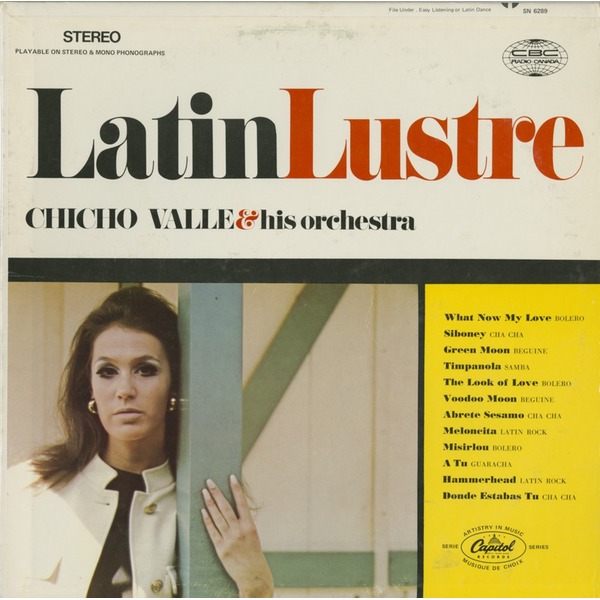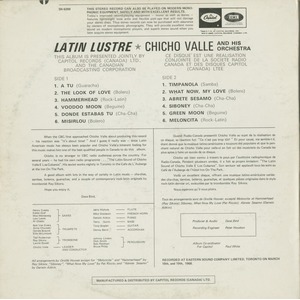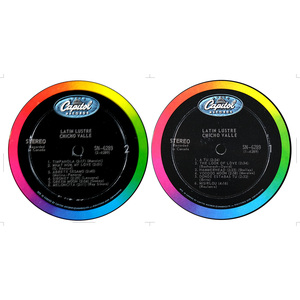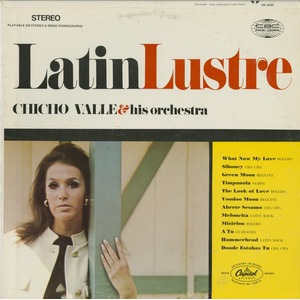Information/Write-up
Chicho Valle – Canada’s First Latin Voice
When Chicho Valle arrived in Toronto in 1946, he stepped into a city where Latin music was virtually unknown. A Cuban émigré with a guitar and a vision, Valle would spend the next three decades patiently building a space for the rhythms of his homeland, long before Canada had the immigrant communities or infrastructure to support them. In doing so, he became the country’s first significant Latin bandleader and a quiet pioneer of cultural change.
Born Amador Valle in Cienfuegos, Cuba on July 2, 1922, Chicho grew up in a musical household. His older brother Héctor led a dance orchestra, and Chicho was singing with it by the age of nine. He soon picked up the guitar and followed in his brother’s footsteps, eventually leading small ensembles of his own. In his late teens he moved north to New Orleans, where he enrolled at Loyola University to study law. But the lure of music was stronger than the lecture hall. By the early 1940s he was fronting a trio—two women and himself—playing private parties and nightclub gigs across the Crescent City.
His path to Canada came unexpectedly. In 1946 the CBC invited him to Toronto to appear on its new radio feature Latin Music Serenade. He debuted on air that May, and the response was strong enough that he decided to stay. Within a year, he had formed Chicho Valle y Los Cubanos, a group that initially featured only one Cuban—himself—supported by Toronto musicians. Despite the mix of backgrounds, the band’s sound rang true, steeped in cha-cha, samba, bolero, and the emerging strains of Latin jazz.
The timing was both promising and difficult. In the postwar years, Toronto audiences were curious about Latin rhythms, but the city had no established Latino community to sustain them. Valle carried the music almost alone. He carved out residencies in clubs and hotels—the Cork Room, the Barclay, the Prince George, and Muskoka’s Bigwig Inn among them—where his band became a novelty attraction that slowly gained loyal followers. He was a fixture of Toronto nightlife throughout the 1950s, performing for dancers who often had little exposure to Cuban or Mexican music beyond Hollywood musicals.
Radio and television helped amplify his reach. His CBC radio show The Latin Sound of Chicho Valle y Los Cubanos ran for nearly two decades, and he made guest appearances on The Barris Beat, Showtime, and Cross Canada Hit Parade. By the mid-1950s his trio had grown into a full tentet, adding Canadian jazz players like pianist Rudy Toth, trombonist Ray Sikora, and guitarist Stan Wilson. Valle’s knack for combining seasoned local players with Latin repertoire gave his groups a distinctive character: authentic enough to excite, adaptable enough to work within the Canadian entertainment mainstream.
Recording opportunities followed. In 1962 he cut sides for Toronto’s Topper Records, including the single Cha Cha Cha/Samba, which caught the attention of Lyman Potts and led to a Canadian Talent Library album distributed to radio stations nationwide. A second album followed in 1968, released through Capitol Canada, and featured some of Toronto’s top session musicians: Pat Riccio, Laurie Bower, Teddy Roderman, and guitarist Tony Braden among them. The records blended Cuban standards with English-language pop tunes recast in Latin arrangements—a strategy designed to bridge cultures, though commercial impact remained modest.
Even when the records failed to sell widely, Valle’s influence was felt. By the 1970s he had become musical director for the Four Seasons hotel chain, while also running a booking agency that gave opportunities to new Latin groups arriving in Canada. Bands like Los Amigos, Tequila, and Hope Pepper found work thanks to his support. In a city still largely unfamiliar with Latin culture, Valle quietly opened doors.
His career was never about chart success or mass popularity—factors limited by demographics and timing—but about persistence and representation. For decades, he kept Latin music present in Canadian clubs, on the CBC airwaves, and in hotel ballrooms. Later generations of Latin musicians in Toronto—from salsa bands of the 1980s to today’s fusion ensembles—owe part of their path to the groundwork he laid.
Chicho Valle’s legacy rests not in gold records but in cultural roots. He brought the rhythms of Cuba to a northern city unprepared for them, sustained them long enough for others to follow, and proved that Canadian audiences could be moved by congas and bongos just as much as by guitars and fiddles. In the broader story of Canadian music, he stands as a trailblazer: the country’s first Latin voice, singing long before the chorus arrived.
-Robert Williston
Arangements: Chicho Valle, Darwin Aitkin, Pat Riccio and Ray Sikora
Tony Bradan: guitar
Terry Quinn: bass
Darwin Aitkin: piano
Mike Goodwin: french horn
Jerry Nichols: flute
Bob Reinhart: percussion
Bruce Phillip: percussion
Dick Smith: percussion
Johnny Lindon: percussion
Horns:
Al Cheslo: saxophone
Eddie Graf: saxophone
Henry Cuesta: saxophone
Lew Lewis: saxophone
Mo Weinsweig: saxophone
Laurie Bower: trombone
Ray Sikora: trombone
Ted Roderman: trombone
Arnie Chycoski: Trumpet
Bob Van Evera: Trumpet
Ellis McLintock: Trumpet
Gordie Braund: Trumpet
Engineered by Peter Houston
Produced by Dave Bird
Recorded at Eastern Sound, Toronto, Ontario




No Comments